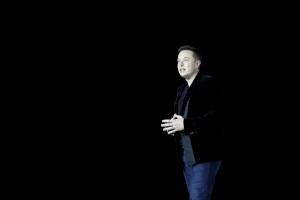Musk offers proposal on China-Taiwan tensions, after Russia-Ukraine plan
 Send a link to a friend
Send a link to a friend
 [October 08, 2022]
By Kanishka Singh and Hyunjoo Jin [October 08, 2022]
By Kanishka Singh and Hyunjoo Jin
WASHINGTON (Reuters) -Billionaire Elon
Musk, days after floating a possible deal to end the war between Russia
and Ukraine that drew condemnation in Ukraine, suggested that tensions
between China and Taiwan could be resolved by handing over some control
of Taiwan to Beijing.
"My recommendation . . . would be to figure out a special
administrative zone for Taiwan that is reasonably palatable, probably
won't make everyone happy," the world's richest person, told the
Financial Times in an interview published on Friday.
Musk was responding to a question about China, where his Tesla electric
car company operates a large factory in Shanghai.
Beijing, which says democratically ruled Taiwan is one of its provinces,
has long vowed to bring Taiwan under its control and has not ruled out
the use of force to do so. Taiwan's government strongly objects to
China's sovereignty claims and says only the island's 23 million people
can decide its future.

"And it's possible, and I think probably, in fact, that they could have
an arrangement that's more lenient than Hong Kong," Musk, was quoted as
saying by the newspaper.
China has offered Taiwan a "one country, two systems" model of autonomy
similar to what Hong Kong has, but that has been rejected by all
mainstream political parties in Taiwan and has no public support,
especially after Beijing imposed a tough National Security Law in the
city in 2020.
Taiwan's Foreign Ministry declined to comment on Musk's comments on
Saturday.
Wang Ting-yu, a senior lawmaker for Taiwan's ruling Democratic
Progressive Party who sits on parliament's foreign affairs and defense
committee, slammed Musk on his Facebook page.
"Individual independent companies cannot take their ownership as a
joke," Wang said. "So why should they casually pass off the democratic
freedoms, sovereignty and way of life of 23 million Taiwanese? It's not
acceptable for Ukraine, and Taiwan certainly won't allow it."
[to top of second column]
|

Tesla Motors CEO Elon Musk delivers
Model X electric sports-utility vehicles during a presentation in
Freemont, California September 29, 2015. REUTERS/Stephen Lam/File
Photo

A senior Taiwanese official familiar with security planning in the
region told Reuters that "Musk needs to find a clear-headed
political adviser".
"The world has seen clearly what happened to Hong Kong," the
official said on condition of anonymity as he was not authorized to
speak to the media. "Hong Kong's economic and social vibrancy
abruptly ended under Beijing's totalitarian rule."
Chinese foreign ministry spokesperson Mao Ning, asked about Musk's
remarks, said Taiwan was a "domestic affair", adding that Beijing
would continue to adhere to the principle of peaceful reunification
while "resolutely smashing" Taiwanese separatism.
The Shanghai factory accounted for about half of Tesla's global
deliveries last year. Musk said China has sought assurances that he
would not offer the Starlink internet service of his SpaceX rocket
company there.
Musk said he reckoned that conflict over Taiwan was inevitable and
warned of its potential impact on not only Tesla, but also on iPhone
maker Apple Inc and the wider economy. The interview did not
elaborate on those remarks.
Earlier this week, Musk proposed that Ukraine permanently cede
Crimea to Russia, that new referendums be held under U.N. auspices
to determine the fate of Russian-controlled territory, and that
Ukraine agree to neutrality.
He asked Twitter users to weigh in on his plan, drawing sharp
criticism from Ukrainian President Volodymyr Zelenskiy, who proposed
his own Twitter poll: "Which @elonmusk do you like more? One who
supports Ukraine (or) one who supports Russia."
(Reporting by Kanishka Singh in Washington and Hyunjoo Jin in San
Francisco; Additional reporting by Yimou Lee and Ben Blanchard in
Taipei, and Yew Lun Tian in Beijing; Editing by Leslie Adler and
William Mallard)
[© 2022 Thomson Reuters. All rights
reserved.]
This material may not be published,
broadcast, rewritten or redistributed.
Thompson Reuters is solely responsible for this content.
 |